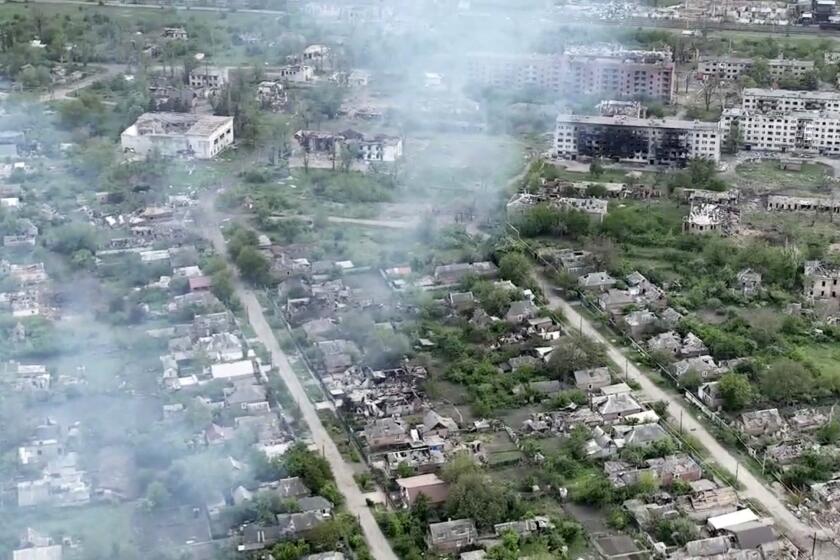S. Africa Warns It May Cut Off Strategic Metals to West
Warned by the United States, the European Community and the Commonwealth to end apartheid or face international isolation, South Africa is saying that it will not be forced into reforms and may respond to harsher economic sanctions by cutting off shipments of the strategic minerals it supplies to the West.
President Pieter W. Botha, again emphasizing his determination to proceed with political, economic and social reforms at his own pace, told a political rally that, if the United States and Western Europe impose sanctions, South Africa may withhold its exports of chromium, used in many steel alloys. That, he said, would put 1 million Americans out of work and shut down the automobile industries of Europe.
“In digging a grave for South Africa, they could end up harming themselves,” Botha declared to the cheers of his ruling National Party Monday night at an election rally in the Orange Free State.
But trade economists and diplomats said that an embargo on mineral exports would hurt South Africa more than its customers in the industrial West. South Africa’s recession-hit economy, they noted, is heavily dependent on mining, while the United States and its allies could probably cope with even acute shortages of most minerals by substituting other minerals or taking conservation steps.
Seven more deaths were reported, meanwhile, in the country’s continuing unrest. Two blacks were shot and killed by police in daylong clashes around the Crossroads squatter settlement outside Cape Town, where Colored (mixed-race) youths also continued to battle police. Three were killed in various incidents in eastern Cape province, and two in black townships outside Johannesburg.
No-Go Areas
Police are making concerted efforts to restore order in the Cape Town area, where as many as 150 violent incidents, mostly stonings and firebomb attacks, are recorded daily. But the authorities are encountering stiff resistance not only in black townships--which are becoming no-go areas for all but the largest, most heavily armed patrols--but also in the Colored suburbs. There, tough police action has left dozens dead and whole communities radicalized.
Late Monday, authorities arrested Trevor Manuel, one of the few leaders of the United Democratic Front anti-apartheid coalition still free. Manuel, Cape Town secretary of the front and a member of its national leadership, emerged from hiding last week to address several rallies and to try to put the organization back into action.
Botha, speaking to an audience of his conservative, Dutch-descended Afrikaner people, denied critics’ contentions that the unrest has become critical and grown beyond the government’s ability to control it.
He rejected demands from the far right that the police take tougher action, as well as those from business, clergy, educators and the liberal opposition that he accelerate the pace of change.
In another challenge to Botha’s determined, step-by-step approach to reform, seven theologians of the Dutch Reformed Church and its black, Colored and Asian branches announced plans to meet with the African National Congress guerrilla organization.
A spokesman for the president, who last week revoked the passports of eight Afrikaner students and a university chaplain to prevent similar talks, said the churchmen are naive and would only lend credibility to “a murderous organization” if they pursue the meeting in Zambia.
Responding to this week’s call by Commonwealth leaders to begin dismantling apartheid within six months, Botha said broad efforts are under way to find a solution to the nation’s problems. But he added, “We will not accept any notice to complete discussions within six months--only South Africans can decide that.”
His threat to end exports of strategic minerals and metals-- including platinum, manganese and vanadium as well as chromium--was studied by diplomats and business analysts for its political, rather than economic, implications.
“What are they going to do with their chromium and manganese--eat it?” a senior Western diplomat in Pretoria remarked. “This country’s economy is absolutely dependent on the mining sector and its exports, and Botha’s threat to shut it down is just so much bluster.
“An embargo on mineral exports, either selective or total, would moreover break all of South Africa’s trading ties, and the (foreign) banks would do it in a matter of a few hours because they would worry about how their loans would be repaid, how South Africa’s imports would be financed, and about the basic stability of this already very troubled economy.”
Major Source of Wealth
Mining now accounts for 26% of South Africa’s gross domestic product and 75% of its foreign exchange earnings.
South Africa supplies 55% of the chromium used by U.S. industry (mostly to make stainless steel and other corrosion- and heat-resistant alloys), 49% of the platinum group of metals (now used as catalysts in industry and in converters curbing auto pollution), 39% of the manganese (essential for steelmaking) and 44% of the vanadium (used to toughen steel).
More to Read
Start your day right
Sign up for Essential California for news, features and recommendations from the L.A. Times and beyond in your inbox six days a week.
You may occasionally receive promotional content from the Los Angeles Times.






